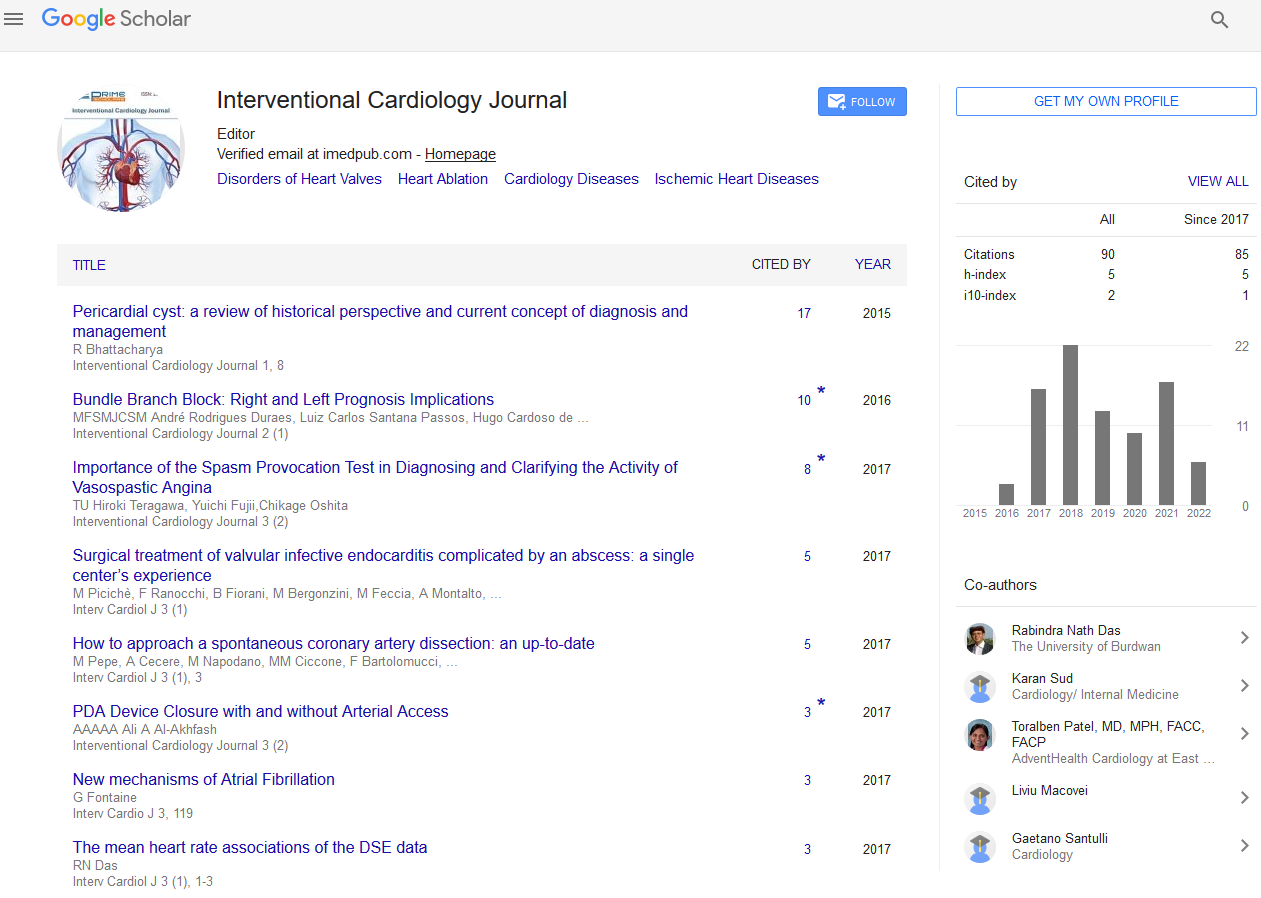Commentary Article - (2022) Volume 8, Issue 4
The Importance of Cardiothoracic Surgeon and Its Specific Topics
Aabid Shaik*
1Department of Cardiothoracic Surgeon, University of Dhakaaabidshaik@ gmail.com, Bangladesh
*Correspondence:
Aabid Shaik, Department of Cardiothoracic Surgeon, University of Dhakaaabidshaik@ gmail.com,
Bangladesh,
Email:
Received: 29-Mar-2022, Manuscript No. ipic-22-13391;
Editor assigned: 31-Mar-2022, Pre QC No. ipic-22-13391(QC);
Reviewed: 14-Apr-2022, QC No. ipic-22-13391;
Revised: 19-Apr-2022, Manuscript No. ipic-22-13391(R);
Published:
26-Apr-2022, DOI: 10.21767/2471-8157.8.4.20
Description
A cardiothoracic surgeon is a doctor who specializes in surgery
on the heart, lungs, esophagus, and other organs of the chest.
This includes cardiac surgeons, cardiovascular surgeons, general
thoracic surgeons, and surgeons who may be referred to
as congenital cardiac surgeons. Cardiothoracic surgeons work
on diseases that occur in the organs in the chest and in the
structures and tissues of the bones that make up the chest
cavity. Common chest surgeons primarily treat lung cancer and
diseases of the esophagus and chest wall. Cardiac-thoracic surgery
is a field of medicine related to the surgical treatment of
organs in the thoracic cavity, generally the treatment of heart
(heart disease), lungs (lung disease), and other disorders of the
thoracic or medial structure. Cardiothoracic surgery is further
subdivided into cardiac surgery (including the heart and large
blood vessels) and thoracic surgery (including the lungs, esophagus,
thymus, etc.). Become a fully qualified surgeon. Cardiothoracic
surgeons graduate from medical school and complete
5 years of residence in general surgery, followed by 2 or 3 years
of residence in cardiothoracic surgery, or 6 years of integrated
residence in cardiothoracic surgery. Some cardiothoracic
surgeons choose to do additional training at the subspecialty,
but this training is optional except for congenital heart disease
surgery, which requires the completion of a one-year fellowship.
Cardiac surgery training can be combined with thoracic or
vascular surgery and is called cardiovascular or cardiothoracic
or cardiovascular thoracic surgery in the community. Cardiac
surgeons further specialize in heart surgery by pursuing fellowship
on a variety of subjects, including pediatric heart surgery,
heart transplantation, adult acquired heart disease, weak
heart problems, and many other heart-related problems. I can.
With the development of heart surgery and cardiopulmonary
bypass technology, the mortality rate from these surgeries has
been reduced to relatively low levels. For example, repair from
congenital heart disease is currently an estimated mortality
rate. The main problem with heart surgery is the development of neurological damage. Stroke occurs in people who have had
heart surgery and is higher in people who are at risk of stroke.
A more subtle population of neurocognitive impairment due to
cardiopulmonary bypass is known as post-perfusion syndrome
and is sometimes referred to as the "pump head." Symptoms
of post-perfusion syndrome were initially felt to be permanent,
but were found to be transient without persistent neuropathy.
A common risk model called Euro SCORE has been developed
to assess the performance of the surgical department and individual
surgeons. It takes many health factors from the patient
and uses pre-calculated logistic regression coefficients to try to
give a percentage of the probability of being discharged from
survival. Within the UK, this EuroSCORE was used to break
down all cardiothoracic surgery centers and show if the unit
and its individual surgeons were performing surgery within acceptable
limits. Results are available on the CQC website.
Conclusion
However, the exact methodology used has not been published
and there is no raw data on which to base the results. Infectious
diseases are major Congenital cardiac surgeons treat babies
and children who have holes between the heart chambers
or abnormal connections in the heart. Cardiac-thoracic surgery
is a field of medicine related to the surgical treatment of organs
in the thoracic cavity, generally the treatment of heart.
Acknowledgement
The author is grateful to the journal editor and the anonymous
reviewers for their helpful comments and suggestions.
Conflict of Interest
The author declared no potential conflicts of interest for the
research, authorship, and/or publication of this article.
Citation: Aabid S (2022) The Importance of Cardiothoracic Surgeon and Its Specific Topics. Interv Cardiol J .8 .4:20
Copyright: © Aabid S. This is an open-access article distributed under the terms of the Creative Commons Attribution License,
which permits unrestricted use, distribution, and reproduction in any medium, provided the original author and source are
credited

